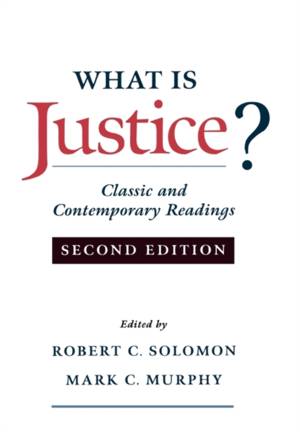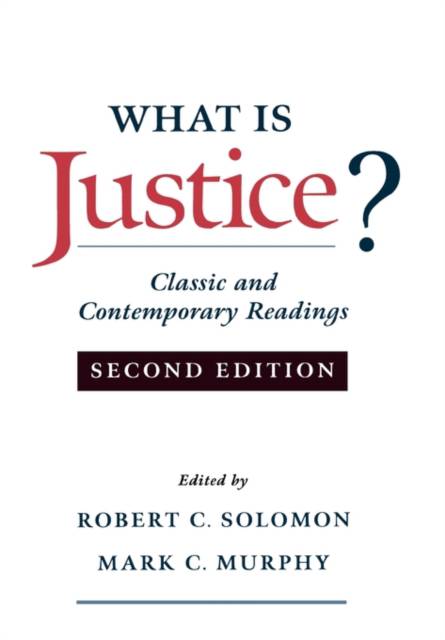
- Afhalen na 1 uur in een winkel met voorraad
- Gratis thuislevering in België vanaf € 30
- Ruim aanbod met 7 miljoen producten
- Afhalen na 1 uur in een winkel met voorraad
- Gratis thuislevering in België vanaf € 30
- Ruim aanbod met 7 miljoen producten
Zoeken
What Is Justice?
Classic and Contemporary Readings
Robert C Solomon, Mark C Murphy
Paperback | Engels
€ 164,45
+ 328 punten
Omschrijving
What is Justice? Classic and Contemporary Readings, 2/e, brings together many of the most prominent and influential writings on the topic of justice, providing an exceptionally comprehensive introduction to the subject. It places special emphasis on "social contract" theories of justice, both ancient and modern, culminating in the monumental work of John Rawls and various responses to his work. It also deals with questions of retributive justice and punishment, topics that are often excluded from other volumes on justice. This new edition features expanded and updated readings on justice and punishment and includes more recent responses to John Rawls's work.
Part One of the book features selections from classical sources including Homer, Plato, Aristotle, Aquinas, and Mencius, as well as excerpts from the Bible and the Koran. Part Two provides readings on the state of nature and the social contract, from Hobbes and Locke to Rawls, Nozick, Gauthier, and Baier. Part Three includes the Declaration of Independence and Amendments to the U.S. Constitution in addition to selections on property and social justice by Locke, Hume, Adam Smith, Engels, Marx, Mill, and several contemporary authors. Part Four offers a wide variety of readings on punishment, several of which address the death penalty. Part Five begins with selections from Rawls's work and includes responses from Dworkin, Nagel, Nozick, MacIntyre, Sandel, Walzer, Okin, and Rawls himself. Each selection is preceded by a brief introduction and each of the five parts opens with an introduction. The volume is further enhanced by a general introduction and an updated and extensive bibliography.
Ideal for a wide variety of courses including social and political philosophy, ethics, philosophy of law, and contemporary moral problems, What Is Justice?, 2/e, does not assume any philosophical or specialized background. It is also engaging reading for anyone interested in justice.
Part One of the book features selections from classical sources including Homer, Plato, Aristotle, Aquinas, and Mencius, as well as excerpts from the Bible and the Koran. Part Two provides readings on the state of nature and the social contract, from Hobbes and Locke to Rawls, Nozick, Gauthier, and Baier. Part Three includes the Declaration of Independence and Amendments to the U.S. Constitution in addition to selections on property and social justice by Locke, Hume, Adam Smith, Engels, Marx, Mill, and several contemporary authors. Part Four offers a wide variety of readings on punishment, several of which address the death penalty. Part Five begins with selections from Rawls's work and includes responses from Dworkin, Nagel, Nozick, MacIntyre, Sandel, Walzer, Okin, and Rawls himself. Each selection is preceded by a brief introduction and each of the five parts opens with an introduction. The volume is further enhanced by a general introduction and an updated and extensive bibliography.
Ideal for a wide variety of courses including social and political philosophy, ethics, philosophy of law, and contemporary moral problems, What Is Justice?, 2/e, does not assume any philosophical or specialized background. It is also engaging reading for anyone interested in justice.
Specificaties
Betrokkenen
- Auteur(s):
- Uitgeverij:
Inhoud
- Aantal bladzijden:
- 366
- Taal:
- Engels
Eigenschappen
- Productcode (EAN):
- 9780195128109
- Verschijningsdatum:
- 11/11/1999
- Uitvoering:
- Paperback
- Formaat:
- Trade paperback (VS)
- Afmetingen:
- 171 mm x 240 mm
- Gewicht:
- 598 g

Alleen bij Standaard Boekhandel
+ 328 punten op je klantenkaart van Standaard Boekhandel
Beoordelingen
We publiceren alleen reviews die voldoen aan de voorwaarden voor reviews. Bekijk onze voorwaarden voor reviews.








